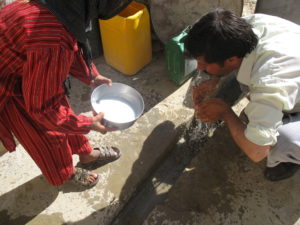Skat Consulting was mandated by ACF Afghanistan to carry out an external evaluation of WASH project implemented in peri-urban areas of Kabul and funded by ECHO.
Country:
Afghanistan
Project Period:
2008
Name of Client(s):
Action against Hunger Afghanistan
Description of the Project:
Action Contre la Faim has been involved in water, sanitation and hygiene promotion (WASH) projects to reduce the vulnerability of people living in unplanned, peri-urban areas of Kabul City since 2000. The project was funded by ECHO with approximately € 775’000 (WASH component only) and was implemented by ACF between February 2006 and June 2007 in selected areas of Districts 13 and 16 of Kabul. The specific project objective was to reduce the occurrence of water–related diseases in the targeted areas through a combined approach aiming at improving sustainable access to safe water and sanitation facilities and improving hygiene behaviours.
The external evaluation was commissioned by ACF to a team of 2 evaluators from Skat with the purpose of obtaining an objective analysis of the implementation of the water and sanitation aspects of the 2006 ECHO funded project. The income generation and the social research activities included in the same program were not subject of this evaluation.
The final aims was to assess the work accomplished during the project phase and to present recommendations for further water and sanitation interventions in the peri-urban context of Kabul. The programme was evaluated under the classical criteria of: impact, appropriateness, sustainability, effectiveness, coherence, coverage and efficiency, as well as cross cutting issues such as environmental impacts, human rights and gender issues. It considered all levels of the intervention (e.g. household, community and several facilities levels).
It was also assessed whether the current programme strategy is appropriate in an urban or peri-urban context and whether it should it be continued or discontinued. In this sense, the evaluation contributed to a general strategy of intervention for water, sanitation and hygiene (WASH) projects in peri-urban contexts like Kabul taking into consideration governmental plans or guidelines.




